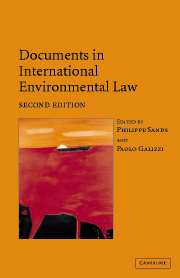Book contents
- Frontmatter
- Contents
- Preface
- PART I General instruments
- PART II Atmosphere
- PART III Oceans: global
- PART IIIB Oceans: regional
- 12 Convention for the Protection of the Marine Environment and the Coastal Region of the Mediterranean, 16 February 1976, as revised in Barcelona, 10 June 1995
- 12A Protocol for the Prevention and Elimination of Pollution of the Mediterranean Sea by Dumping from Ships and Aircraft or Incineration at Sea, 16 February 1976, as revised on 10 June 1995
- 12B Protocol Concerning Co-operation in Preventing Pollution from Ships and, in Cases of Emergency, Combating Pollution of the Mediterranean Sea, 25 January 2002
- 12C Protocol for the Protection of the Mediterranean Sea against Pollution from Land-Based Sources and Activities, 17 May 1980, as amended on 7 March 1996
- 12D Protocol Concerning Specially Protected Areas and Biological Diversity in the Mediterranean, 10 June 1995, and including Annexes adopted on 24 November 1996
- 12E Protocol for the Protection of the Mediterranean Sea against Pollution Resulting from Exploration and Exploitation of the Continental Shelf and the Seabed and its Subsoil, 14 October 1994
- 12F Protocol on the Prevention of Pollution of the Mediterranean Sea by Transboundary Movements of Hazardous Wastes and their Disposal, 1 October 1996
- 13 Convention for the Protection of the Marine Environment of the North-East Atlantic, 22 September 1992
- PART IV Freshwater resources
- PART V Biodiversity
- PART VIA Hazardous substances and activities: nuclear
- PART VIB Hazardous substances and activities: pesticides
- PART VIC Hazardous substances and activities: waste
- PART VII Human rights and the environment
- PART VIII War and the environment
- PART IX Trade and the environment
- PART X Environmental impact assessment and access to information
- PART XI Liability for environmental damage and breaches of environmental obligations
- PART XII The Antarctic
12F - Protocol on the Prevention of Pollution of the Mediterranean Sea by Transboundary Movements of Hazardous Wastes and their Disposal, 1 October 1996
Published online by Cambridge University Press: 05 June 2012
- Frontmatter
- Contents
- Preface
- PART I General instruments
- PART II Atmosphere
- PART III Oceans: global
- PART IIIB Oceans: regional
- 12 Convention for the Protection of the Marine Environment and the Coastal Region of the Mediterranean, 16 February 1976, as revised in Barcelona, 10 June 1995
- 12A Protocol for the Prevention and Elimination of Pollution of the Mediterranean Sea by Dumping from Ships and Aircraft or Incineration at Sea, 16 February 1976, as revised on 10 June 1995
- 12B Protocol Concerning Co-operation in Preventing Pollution from Ships and, in Cases of Emergency, Combating Pollution of the Mediterranean Sea, 25 January 2002
- 12C Protocol for the Protection of the Mediterranean Sea against Pollution from Land-Based Sources and Activities, 17 May 1980, as amended on 7 March 1996
- 12D Protocol Concerning Specially Protected Areas and Biological Diversity in the Mediterranean, 10 June 1995, and including Annexes adopted on 24 November 1996
- 12E Protocol for the Protection of the Mediterranean Sea against Pollution Resulting from Exploration and Exploitation of the Continental Shelf and the Seabed and its Subsoil, 14 October 1994
- 12F Protocol on the Prevention of Pollution of the Mediterranean Sea by Transboundary Movements of Hazardous Wastes and their Disposal, 1 October 1996
- 13 Convention for the Protection of the Marine Environment of the North-East Atlantic, 22 September 1992
- PART IV Freshwater resources
- PART V Biodiversity
- PART VIA Hazardous substances and activities: nuclear
- PART VIB Hazardous substances and activities: pesticides
- PART VIC Hazardous substances and activities: waste
- PART VII Human rights and the environment
- PART VIII War and the environment
- PART IX Trade and the environment
- PART X Environmental impact assessment and access to information
- PART XI Liability for environmental damage and breaches of environmental obligations
- PART XII The Antarctic
Summary
Editorial note
The Protocol on the Prevention of Pollution of the Mediterranean Sea by Transboundary Movements of Hazardous Wastes and their Disposal aims to prevent, abate and eliminate pollution in the Mediterranean Sea Area caused by transboundary movements and disposal of hazardous wastes (Article 5). Hazardous wastes are defined as wastes that belong to any category in Annex I to the Protocol; wastes defined or considered to be hazardous by the domestic legislation of the State of export, import or transit; wastes that possess the characteristics contained in Annex II to the Protocol; hazardous substances that have been banned or expired or whose registration has been cancelled or refused or voluntarily withdrawn or omitted (Article 3). The generator, the exporter or the importer, depending on the circumstances, shall bear the responsibility for checking with the competent authorities of the State of export, import or transit that a particular waste, prior to its transboundary movement, is not subject to the Protocol (Article 3(3)).
Parties shall take all appropriate measures to reduce to a minimum, and where possible to eliminate, the generation of hazardous waste (Article 5(2)). They shall also take all appropriate measures to reduce to a minimum the transboundary movement of hazardous waste in the Mediterranean, and if possible eliminate such movement (Article 5(3)). To achieve this goal, Parties have a right to ban the import of hazardous wastes (Article 5(3)). The export or transit of hazardous wastes to developing countries must be prohibited (Article 5(4)).
- Type
- Chapter
- Information
- Documents in International Environmental Law , pp. 486 - 504Publisher: Cambridge University PressPrint publication year: 2004



